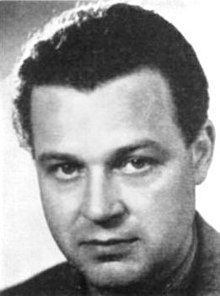Gunnar Myrdal

Karl Gunnar Myrdal (December 6, 1898 – May 17, 1987) was a Swedish economist and politician. He was born in Gustafs, Dalarna, and died in Danderyd, close to Stockholm. He graduated from Stockholm University Law School in 1923 and received a doctorate degree in Economics in 1927. He married Alva Myrdal in 1924, and they had three children including Jan Myrdal and Sissela Bok. He, along with Friedrich von Hayek, won the 1974 Nobel Prize for Economics for their "pioneering work in the theory of money and economic fluctuations and for their penetrating analysis of the interdependence of economic, social and institutional phenomena."[1]
He was Social Democratic member of parliament from 1933 and minister of trade from 1945 to 1947 in Tage Erlanders goverment.
Gunnar Myrdal himself is known for his 1944 study, An American Dilemma: The Negro Problem and Modern Democracy, which influenced the US Supreme Court 1954 decision in Brown v. Board of Education to outlaw racial segregation in public schools. Myrdal was also a signatory of the 1950 UNESCO statement The Race Question, which also influenced Brown v. Board.
Career
In Gunnar Myrdal's juris doctor degree in Economics, published in 1927, he examined the role of expectations in price formation. His analysis strongly influenced the Stockholm school. In his early research Myrdal anticipated ideas later developed by John Maynard Keynes.
He was professor of economics at the Stockholm School of Economics from 1933 to 1947 and simultaneously a Social Democratic member of parliament. He became minister of trade from 1945 to 1947. For the next 10 years he was executive secretary of the United Nations Economic Commission for Europe after which Asia and third world poverty commanded his attention for a while. His research about Asia and the causes of poverty resulted in his influential study "Asian Drama: An inquiry into the Poverty of Nations" (1968). Between 1960 and 1967 he was professor of international economics at Stockholm University. In 1961, he founded the Institute for International Economic Studies at the university. He shared the Bank of Sweden Prize in Economic Sciences (otherwise known as the Nobel Memorial Prize in Economics) with Friedrich Hayek in 1974, but argued for its abolition because it had been given to economic liberals such as Hayek and Milton Friedman.[2]
Myrdal is perhaps even more famous for his influential and landmark book An American Dilemma: The Negro Problem and Modern Democracy, originally published in 1944 and commissioned by the Carnegie Foundation. The "American dilemma" is between high ideals on the one hand and poor performance on the other: in the two generations or more since the Civil War, the U.S. had not been able to put its human rights ideals into practice for the black (or Negro) tenth of its population. This comprehensive study of sociological (including economics), anthropological and legal data on black-white race relations in the U.S. was begun in 1938, after Myrdal was selected by the Carnegie corporation to direct the study. It should be noted here that Myrdal planned on doing a similar study on the question of gender instead of race; however, he could not find the funding for this project so he never completed it.
Myrdal published many other notable works, both before and after this most notable work and, among many other contributions to social and public policy, founded and chaired the Stockholm International Peace Research Institute. Internationally revered as a father-figure of social policy, he contributed to social democratic thinking throughout the world, in collaboration with friends and colleagues in the political and academic arenas. Sweden and Britain were among the pioneers of a welfare state and books by Myrdal (Beyond the Welfare State - New Haven, 1958) and Richard Titmuss (Essays on “The Welfare State” - London, 1958) unsurprisingly explore similar themes.
See also
Publications
- The Equality Issue in World Development - The American Economic Review, vol 79, no 6, Dec 1989
- Fiscal Policy in the Business Cycle - The American Economic Review, vol 21, no 1, Mar 1939
- America and Vietnam – Transition, No. 3, Oct, 1967
- Gunnar Myrdal on Population Policy in the Underdeveloped World – Population and Development Review, Vol 13, No. 3, Sept. 1987
- Twenty Years of the United Nations Economic Commission for Europe – International Organization, Vol 22, No. 3, Summer, 1968
- Challenge to Affluence Published by Random House 1963
- Conference of the British Sociological Association, 1953. II Opening Address: The Relation between Social Theory and Social Policy The British Journal of Sociology, Vol. 4, No. 3, Sept, 1953
- Social Trends in America and Strategic Approaches to the Negro Problem – Phylon, Vol. 9, No. 3, 3rd Quarter, 1948
- Value in Social Theory: A Selection of Essays on Methodology Edited by Paul Streeten, published by Harper 1958
- An American Dilemma: The Negro Problem and Modern Democracy Published by Harper & Bros, 1944
- Contact With America (Kontakt med Amerika) - 1941 [3]
- Population, a Problem for Democracy The Godkin Lectures, Published by Harvard University Press, 1940
- Crisis in the Population Question – 1934
- The Political Element in the Development of Economic Theory
(Note: The Royal Library of Sweden has a complete bibliography in Swedish.)
References
- ^ The Sveriges Riksbank Prize in Economic Sciences in Memory of Alfred Nobel 1974 9 October, 1974
- ^ Brittan, Samuel; “The not so noble Nobel Prize”, Financial Times 19 December 2003.
- ^ Gene Robers and Hank Klibanoff; The Race Beat: The Press, The Civil Rights Struggle, and the Awakening of a Nation. 2006. USA.
External links
- http://nobelprize.org/economics/laureates/1974/press.html
- Pioneering work in the theory of money and economic fluctuations and for their penetrating analysis of the interdependence of economic, social and institutional phenomena
- http://www.africa2000.com/INDX/myrdal.htm
- Gunnar Myrdal – Prize Lecture
